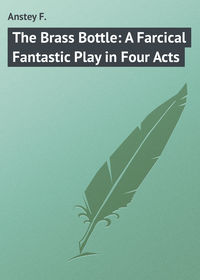 полная версия
полная версияThe Giant's Robe
'You think I am too bad even to love honestly,' said Mark, bitterly; 'but I do.'
'Prove it then,' said Vincent. 'You heard her pleading on the bridge for the woman who would suffer by her husband's shame; she was pleading for herself then – and not to me only, to you! Have pity on her; she is so young to lose all her faith and love and hope at once. You can never let her know what you have been; you can only try to become all she believes you to be.'
In his heart, perhaps, Mark was not sorry to be convinced that what he had resolved to do was impossible. The high-strung mood in which he had been ready to proclaim his wrong-doing was already passing away. Vincent had gained his point.
'You are right,' Mark said slowly; 'I will keep it from her if I can.'
'Very well,' Vincent answered, 'that is settled then. If she asks you what has passed between us, you can say that I have told you my story, but that you are not at liberty to speak of it. Mabel will not try to know more. Stay, I will write a line' (and he went to the corner of the street and wrote a few words on a leaf from his notebook). 'Give that to her,' he said as he returned. 'And now I think we've nothing more to say.'
'Only one other thing,' stammered Mark; 'I must do this… When they – they published your book they paid me… I never touched the money. I have brought it with me to-night; you must take it!' and he held out a small packet of notes.
Vincent turned haughtily away. 'Excuse me,' he said, 'it is not mine; I will have nothing to do with it. Under the circumstances, you can't expect me to touch that money. Keep it; do what you choose with it.'
'I choose this, then!' said Mark, violently, and tearing the notes up, he flung them over the railings to drift down on the rocks or into the tossing grey foam beyond.
'You need not have done that,' said Holroyd, coldly; 'there were the poor. But just as you please!' and he made a movement as if to go.
Mark stopped him with a gesture.
'Are you going like this?' he said, and his voice trembled. 'If you knew all I felt, even you might pity me a little! Can't you forgive?'
Vincent turned. 'No,' he said, shortly, 'I can't. I put temptation in your way, and though I never dreamed then that it could be a temptation to you, I could have forgiven you for giving way to it when you believed me dead. But I came back, and you went on with it; you lied to me – more, you dared to marry her, without a care for the shame and sorrow, which was all you had to bring her. If I said I forgave you for that, it would be a mockery. I don't, and I can't!'
'I see,' said Mark. 'When we meet again we are to be strangers, then?'
'No,' said Vincent; 'if we meet we must do so as ordinary acquaintances – for Mabel's sake. But there are no appearances to keep up here. Can't you see I want to be left to myself?' he asked, with a sudden burst of nervous irritation.
'Have your way then?' said Mark, and left him there by the railings.
Mark's first feelings as he walked slowly back up the little street where the little shops were all shuttered and dark now, were by no means enviable; he felt infinitely mean and small in his own eyes, and shrank from entering Mabel's presence while his nerves were still crawling under the scorching contempt of Vincent's dismissal. If, during the interview, there had been moments when he was deeply contrite and touched at the clemency so unexpectedly shown him, the manner of his pardon seemed to release him from all obligations to gratitude – he had only been forgiven for another's sake; and for a time he almost loathed so disgraceful an immunity, and felt the deep humiliation of a sentence that condemned him 'to pay the price of lies by being constrained to lie on still.' But by degrees, even in that short walk, his elastic temperament began to assert itself; after all, it might have been worse. He might by now have been drifting, dead and disfigured, down the river to Basle; he might have been going back to Mabel with the fearful necessity upon him of telling her all that night. One person knew him, and despised him for what he was; but that person would never tell his secret. That painful scene which had just passed would never have to be gone through again; he could think of it as a horrible dream. Yes, he was safe now, really safe this time. His position was far more secure than when he had read that telegram of Caffyn's; and here he wondered, for the first time, whether Caffyn had been deliberately misled or only mistaken in sending such a delusive message. But that did not very much matter now, and he soon abandoned speculation on the subject. He had much to be thankful for; his future was free from all danger. He had had a severe lesson, and he would profit by it; henceforth (with the one necessary reservation) he would be honest and true – Mabel should never repent her trust in him. 'Sweet Bells Jangled' would be before the world by the time they returned, and after that he feared nothing. And so, though he was subdued and silent on his return, there was no other trace in his manner of what he had suffered during the last hour. He found Mabel by the window of their sitting-room, looking out at the houses across the river, which were now palely clear in the cold moonlight, their lights extinguished, and only a pane glittering here and there in some high dormer window, while the irregular wooden, galleries and hanging outhouses were all thrown up vividly by the intense shadows.
'What a very long time you have been away!' she said; 'but I know Vincent can be very pleasant and interesting if he likes.'
'Very,' said Mark, and gave her Holroyd's note.
'I leave here early to-morrow for Italy,' she read, 'and may not see you again for some little time. I have told your husband my story, but, on consideration, have thought it best to pledge him to tell no one – not even you. But the man who injured me shall be safe for your sake.'
'You did persuade him, then!' she said, looking up gratefully to Mark. 'Oh, I am glad! How good you are, and how well you must have spoken, dear, to make him give up his idea of punishing the man! So Vincent is going away at once. Do you know I am afraid I am rather glad?'
And Mark made no answer; what was there to say?
Vincent stood there by the railings on the Laufenplatz for some time after Mark had left him; he was feeling the reaction both in mind and body from his recent conflict. 'How will it all end?' he asked himself wearily. 'Can any good come from letting this deceit go on? Is he strong enough to carry out his part? If not, the truth will only come at last, and be even more cruel when it does come.' Yet he had done what still seemed the obvious and only thing to do, if Mabel's happiness was considered. He was ashamed even that he had not seen it earlier, and trembled as he remembered that only a providential chance had restrained him from some fatal disclosure to Mabel that afternoon on the bridge. But at least he had acted for the best, and he would hope for it.
Thinking thus, he recrossed the river to Klein-Laufingen, where a mounted German officer, many sizes too big for the little street, was rousing it from its first slumber as he clattered along, with his horse's hoofs striking sparks from the rough cobbles, and passed under the old gateway, where his accoutrements gleamed for an instant in the lamplight before horse and rider vanished in the darkness beyond. Vincent passed out, too, out on the broad white road, and down the hill to his homely Gasthaus. He felt weak and very lonely – lonelier even than when he had parted from Mabel long ago on the eve of his Ceylon voyage. He could hope then; now he had lost her for ever! Still, one of his wishes had been granted – he had been able to be of service to her, to make some sacrifice for her dear sake. She would never know either of his love or his sacrifice, and though he could not pretend that there was no bitterness in that, he felt that it was better thus. 'After all,' he thought, 'she loves that fellow. She would never have cared for me.' And there was truth in this last conclusion. Even if Mabel and Mark had never met, and she could have known Vincent as he was, the knowledge might not have taught her to love. A woman cannot give her heart as a prix Montyon, or there might be more bachelors than there are.
CHAPTER XXXV.
MISSED FIRE!
IT was an evening early in May, and Harold Caffyn was waiting at Victoria for the arrival of the Dover train, which was bringing back Mark and Mabel from the Continent. This delicate attention on his part was the result of a painful uncertainty which had been vexing him ever since the morning on which he read Vincent's farewell note at Wastwater. 'It is a poor tale,' as Mrs. Poyser might say, to throw your bomb and never have the satisfaction of hearing it explode – and yet that was his position; he had 'shot his arrow into the air,' like Longfellow; but, less fortunate than the poet, he was anything but sure that his humble effort had reached 'the heart of a friend.' Now he was going to know. One thing he had ascertained from the Langtons – Vincent Holroyd had certainly followed the couple to Laufingen, and they had seen him there – Harold had found Mrs. Langton full of the wonderful news of the return of the dead. But nothing had come of it as yet; if there was a sensation in store for the literary world, Mabel's letters apparently contained no hint of it, and for a time Caffyn felt unpleasantly apprehensive that there might have been a hitch somehow in his admirable arrangements. Then he reflected that Mabel would naturally spare her mother as long as possible; he would not believe that after all the trouble he had taken, after Holroyd had actually hunted down the culprit, the secret could have been kept from her any longer. No, she must know the real truth, though she might be proud enough to mask her sufferings while she could. But still he longed for some visible assurance that his revenge had not unaccountably failed; and, as he had ascertained that they were to return on this particular evening, and were not to be met except by the Langton carriage, it occurred to him that here would be an excellent opportunity of observing Mabel at a time when she would not imagine it necessary to wear a mask. He would take care to remain unseen himself; a single glance would tell him all he needed to know, and he promised himself enjoyment of a refined and spiritual kind in reading the effects of his revenge on the vivid face he had loved once, and hated now with such malignant intensity. The train came in with a fringe of expectant porters hanging on the footboards, and as the doors flew open to discharge a crowd, flurried but energetic, like stirred ants, even Caffyn's well-regulated pulse beat faster.
He had noticed Champion waiting on the platform and kept his eye upon him in the bustle that followed; he was going up to a compartment now – that must be Mark he was touching his hat to as he received directions; Caffyn could not see Mark's face yet as his back was towards him, but he could see Mabel's as she stepped lightly out on the platform – there was a bright smile on her face as she acknowledged the footman's salute, and seemed to be asking eager questions. Caffyn felt uncomfortable, for there was nothing forced about her smile, no constraint in her eyes as she turned to Mark when they were alone again, and seemed to be expressing her eager delight at being home again. And Mark, too, had the face of a man without a care in the world – something must have gone wrong, terribly wrong, it was clear! They were coming towards him; he had meant to avoid them at first, but now his curiosity would not allow this, and he threw himself in their way, affecting an artless surprise and pleasure at being the first to welcome them back. Mark did not appear at all disconcerted to see him, and Mabel could not be frigid to anybody just then in the flush of happy expectation, which she did not try to conceal; altogether it was a bitter disappointment to Caffyn.
He quite gasped when Mark said, with a frank unconsciousness, and without waiting for the subject to be introduced by him, 'Oh, I say, Caffyn, what on earth made you think poor old Vincent was going back to India at once? He's not going to do anything of the kind; he's wandering about the Continent. We knocked up against him at Laufingen!'
Caffyn gave a searching look at Mabel's sweet, tranquil face, then at Mark's, which bore no sign of guilt or confusion. 'Knocked up against you!' he repeated; 'why – why, didn't he expect to find you there, then?'
Mabel answered this: 'It was quite an accident that he stopped at Laufingen at all,' she said; 'he was going on to Italy.'
Caffyn did not give up even then – he tried one last probe: 'Of course,' he said; 'I forgot, your husband kept him so completely in the dark about it all – eh, Mark? Why, when you got him to come down to Wastwater with me, he had no idea what festivities were in preparation – had he?'
'No, my boy,' said Mark, with a perfectly natural and artistic laugh; 'I really don't believe he had – you mustn't be shocked, darling,' he added to Mabel; 'it was all for his good, poor fellow. I must tell you some day about our little conspiracy. It's all very well for you, though,' he turned to Caffyn again, 'to put it all on to me – you had more to do with it than I – it was your own idea, you know!'
'Oh!' said Caffyn; 'well, if you like to put it in that way – .' He lost his self-possession completely – there was something in all this he could not at all understand.
The fact was that Mark felt himself able now to face the whole world with equanimity; the knowledge that no one would ever detect him made him a consummate actor. He had long made up his mind how he would greet Caffyn when they met again, and he was delighted to find himself so composed and equal to the occasion.
Caffyn stood looking after the carriage as it drove away with them; he had quite lost his bearings: the paper in Holroyd's hand, Mark's own behaviour in so many instances, Vincent's rapid pursuit, had all seemed to point so clearly to one conclusion – yet what was he to think now? He began for the first time to distrust his own penetration; he very much feared that his elaborate scheme of revenge was a failure, that he must choose some other means of humbling Mabel, and must begin all over again, which was a distressing thought to a young man in his situation. He was glad now that he had never talked of his suspicions, and had done nothing openly compromising. He would not give up even yet, until he had seen Holroyd, and been able to pump him judiciously; until then he must bear the dismal suspicion that he had overreached himself.
One of his shafts at least had not fallen altogether wide, for as Mark and Mabel were being driven home across the Park, she said suddenly: 'So Harold knew that Vincent was alive, then?'
'Yes,' said Mark, 'he knew,' and he looked out of the window at the sunset as he spoke.
'And you and Harold kept him from hearing of our wedding?' she said. 'Mark, I thought you said that you had told him?'
'Oh, no,' said Mark; 'you misunderstood – there – there were reasons.'
'Tell me them,' said Mabel.
'Well,' said Mark, 'Vincent was ill – anyone could see that what he wanted was rest, and that the fatigue and – and – the excitement of a wedding would be too much for him – Caffyn wanted a companion up at Wastwater, and begged me to say nothing about our marriage just then, and leave it to him to tell him quietly later on – that's all, darling.'
'I don't like it, dear,' said Mabel; 'I don't like your joining Harold in a thing like that. I know you did it all for the best, but I don't see why you could not have told him; if he was not well enough to come to the wedding we should have understood it!'
'Perhaps you're right,' said Mark, easily, 'but, at all events, no harm has come of it to anybody. How they are thinning the trees along here, aren't they? Just look down that avenue!'
And Mabel let him turn the conversation from a subject she was glad enough to forget.
CHAPTER XXXVI.
LITTLE RIFTS
ONE bright morning in May, not long after the return from the Continent, Mabel was sitting in her own room at the back of the small house which had been taken on Campden Hill; she was writing at a table by the raised window, when the door opened suddenly, and Mark burst in, in a state of suppressed but very evident excitement. 'I have brought you something!' he said, and threw down three peacock-blue volumes upon her open blotting-case; the title, 'Sweet Bells Jangled,' ran in sprawling silver letters from corner to corner of the covers, through a medley of cracked bells and withered hyacinths in dull gold; the general effect being more bold than pleasing. Mabel was just about to exclaim sympathetically, 'What a frightful binding they've given you, dear;' when Mark informed her, with some complacency, that it was his own design. 'Nowadays, you see,' he explained, 'you want something to catch the eye, or you won't be read!' Inwardly Mabel could not help wondering that he could condescend to such a device, or think it necessary in his own case. 'Look at the fly-leaf,' he said, and she opened the first volume, and read the printed dedication, 'To My Wife.' 'I thought that must bring me luck,' he said; 'and now, darling, do you know what you are going to do? You are going to put away all those confounded letters and sit down here, and read the opening chapters carefully, and tell me what you think of them.' For till then he had made continual excuses for not showing her any portion of his new work, either in manuscript or proof, from mixed motives of vanity and diffidence.
Mabel laughed with affectionate pride at his anxiety: 'This is what comes of marrying a great author!' she said; 'go away and let me begin at once, and tell you at lunch how I enjoyed it.'
'No,' said Mark despotically, 'I'm going to stay here – or you might try to skip.'
'But I can't allow that,' she protested; 'suppose I find I'm obliged to skip – suppose it's a terrible disappointment? No, you ridiculous Mark, I didn't mean it – stay if you like, I'm not afraid of being disappointed – though I really would enjoy it best in solitude!'
Mark insisted; he felt that at last he was about to be reinstated in his own opinion, he could wait no longer for the assurance of triumph; when he saw with his own eyes the effect of his genius upon Mabel, when he read the startled delight and growing admiration in her face, then at last he would know that he was not actually an impostor!
There are many methods of self-torture, but perhaps few more ingenious and protracted than submitting the result of one's brain-work to a person whose good opinion we covet, and watching the effect. Mark imposed it on himself, nevertheless, chiefly because in his heart he had very little fear of the result. He took a rocking-chair and sat down opposite Mabel, trying to read the paper; by-and-by, as she read on in silence, his heart began to beat and he rocked himself nervously, while his eyes kept wandering from the columns to the pretty hands supporting the volume which hid Mabel's face. Hands reveal many things, and Mabel's could be expressive enough at times – but they told him nothing then; he watched them turn a leaf from time to time, they always did so deliberately, almost caressingly, he thought, but with no eagerness – although the opening was full of incident. He calculated that she must be at a place where there was a brilliant piece of humorous description; she had a fair share of humour – why didn't she laugh?
'Have you got to that first appearance of the Curate on the tennis-ground?' he asked at last.
She laid down the volume for an instant, and he saw her eyes – they were calm and critical. 'Past that! I am beginning Chapter Three,' she said.
The second chapter had contained some of his most sparkling and rollicking writing – and it had not even moved her to smile! He consoled himself with the reflection that the robuster humour never does appeal to women. He had begun his third chapter with a ludicrous anecdote which, though it bordered on the profane, he had considered too good to be lost, but now he had misgivings.
'I'm afraid,' he ventured dubiously, 'you won't quite like that bit about the bishop, darling?'
'I'm afraid I don't quite,' she replied from behind the book. The story had no real harm in it, even in Mabel's eyes; the only pity was that in any part of 'Illusion' it would have been an obvious blot – and that it did not seem out of keeping in the pages she was reading now.
She had sat down to read with such high hopes, so sure an anticipation of real enjoyment, that it was hard to find that the spell was broken; she tried to believe that she read on because she was interested – her real reason was a dread of some pause, when she would be asked to give her opinion. What should she say?
Perhaps it should be explained at once that the book was not a foolish one; Mark, whatever else he was, could scarcely be called a fool, and had a certain share of the literary faculty; it was full of smart and florid passages that had evidently been industriously polished, and had something of the perishable brilliancy of varnish. There is a kind of vulgarity of mind so subtle as to resist every test but ink, and the cheap and flashy element in Mark's nature had formed a deposit, slight, perhaps, but perceptible in more than one page of 'Sweet Bells Jangled.' Mabel felt her heart grow heavier as she read. Why had he chosen to deliberately lower his level like this? Where were the strong and masterly touch, the tenderness and the dignity of his first book? That had faults, too, even faults of taste – but here the faults had almost overgrown the taste! Surely if she read on, she would find the style attain the old distinction, and the tone grow noble and tender once again – but she read on, and the style was always the same, and the tone, if anything, rather worse!
Mark had long since moved to a spot where he could command her face; her fine eyebrows were slightly drawn, her long lashes lowered, and her mouth compressed as if with pain – somehow the sight did not encourage him. She was becoming conscious that her expression was being closely watched, which seldom adds a charm to reading, and at last she could persevere no longer, and shut the book with a faint sigh.
'Well,' said Mark, desperately; he felt as if his fate hung on her answer.
'I – I – have read so little yet,' she said; 'let me tell you what I think at the end!'
'Tell me what you think of it so far,' said Mark.
'Must I?' she said, almost imploringly.
'Yes,' said Mark, with a grating attempt at a laugh; 'put me out of my misery!'
She loved him too well to make some flattering or evasive reply – she was jealous for his reputation, and could not see him peril it without a protest. 'Oh, Mark,' she cried, locking her hands and pressing them tight together, 'you must feel yourself – it is not your best – you have done such great work – you will again, I know, dear – but this, it is not worthy of you – it is not worthy of "Illusion"!'
He knew too well that it was his best, that it was not in him to do better; if the world's verdict agreed with hers, he was a failure indeed. He had been persuading himself that, after all, he was not a common impostor, that he had genius of his own which would be acknowledged far above his friend's talent; now all at once the conviction began to crumble.
He turned upon her with a white face and a look of anger and mortification in his eyes. 'The first is always the best, of course,' he said bitterly; 'that is the regulation verdict. If "Sweet Bells" had come first, and "Illusion" second, you would have seen this sad falling off in the second book. I did not think you would be the first to take up that silly old cry, Mabel – I thought I could always come to my wife for encouragement and appreciation; it seems I was mistaken!'
Mabel bit her lip, and her eyes were dazzled for a moment: 'You asked me what I thought,' she said in a low voice; 'do you think it was pleasant to tell you? When you ask me again, I shall know better how you expect to be answered!'
He felt all at once what he had done, and hastened to show his penitence; she forgave, and did not let him see how deeply she had been wounded – only from that day some of the poetry of her life had turned to prose. Of 'Sweet Bells Jangled' she never spoke again, and he did not know whether she ever read it to the end or not.









